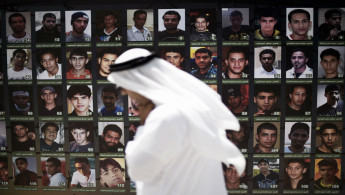Amnesty: Bahrain stripping citizens of nationality at alarming rate
Bahraini authorities are increasingly resorting to the extreme measure of banishing individuals after revoking their citizenship, Amnesty International said on Monday.
Eleven people face imminent expulsion from Bahrain on Tuesday if their deportation orders are upheld in two separate appeal hearings, while the country has already deported two Bahrainis last month, said the rights group.
"The increasing tendency to resort to expulsion of individuals who have had their nationality arbitrarily revoked is a chilling development that points to the wider erosion of human rights in Bahrain in recent years," said James Lynch, Deputy Director of the Middle East and North Africa Programme at Amnesty International.
"Expulsion increasingly appears to be the Bahraini authorities' weapon of choice when it comes to casting out 'unwanted' individuals and silencing dissent."
The group called on the Bahraini government to halt planned expulsions and allow those already expelled to return and have their nationalities reinstated.
Last year Bahrain witnessed a 10-fold increase in nationality revocations with 208 people stripped of their nationality in 2015, compared to just 21 in 2014, according to Amnesty.
The London-based rights group said there are growing fears that 2016 is set to see an upsurge in the number of people expelled from Bahraim based on the number of expulsion orders handed down in recent weeks.
"Arbitrarily stripping citizens of their nationality on the basis of vague allegations is an outrageous breach of Bahrain's international human rights obligations. It is shocking that citizens of Bahrain are being rendered stateless and being deprived of the right to reside in their own country," said James Lynch.
All individuals who have had their nationality revoked are forced to hand in their passports and ID documentation and apply for a residency permit as a foreigner - or leave the country.
Those who have not been granted a residency permit and have remained in Bahrain have been charged with "illegally residing" in the country and given a deportation order.
Amendments to Bahraini law in recent years have broadened the reasons for which an individual could have his or her nationality revoked to include terrorism offences and "anyone whose acts contravene his duty of loyalty to the Kingdom".
As part of the Arab Spring wave of demonstrations, Bahrain witnessed huge protests in 2011 that were driven by the country's Shia majority, who demanded greater political rights from the Sunni-led monarchy.
The protests were quashed after Saudi Arabia and the United Arab Emirates sent in military reinforcements.
Bahrain blamed Iran for stirring up the demonstrations, though a government-sponsored investigation into the unrest said there was no "discernable link" between the protests and the Islamic Republic.
Demonstrators still take to the streets and clash with police in Shia towns surrounding Manama, but are met with a heavy-handed government response including lengthy prison sentences and expulsion.





 Follow the Middle East's top stories in English at The New Arab on Google News
Follow the Middle East's top stories in English at The New Arab on Google News


